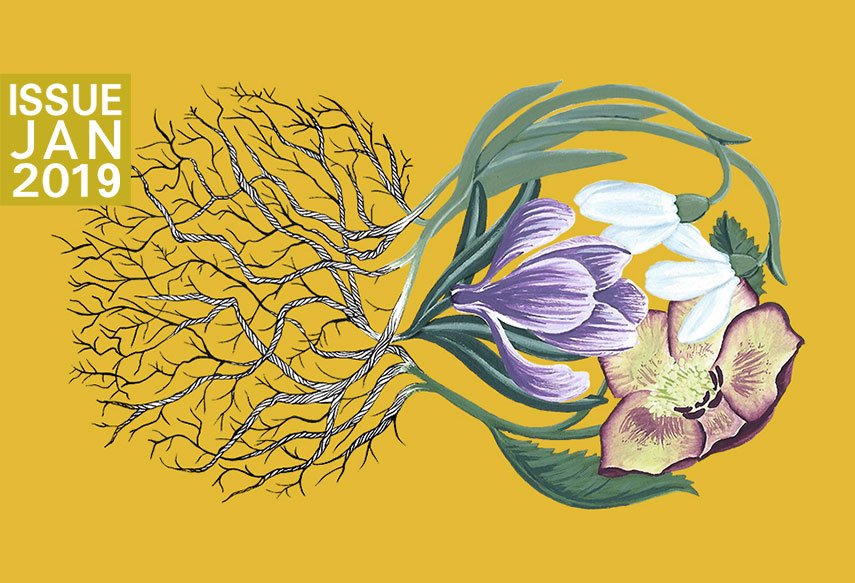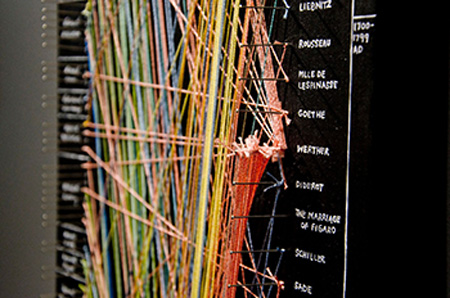- Featuring
- Etel Adnan
- Steinn Steinarr
- Maggie Nelson
- Rodrigo Fuentes
- Jenni Råback on Laura Lindstedt
- Close Approximations Contest Winners
What do you remember in your very bones? Unleash “Body Memory,” our special eighth anniversary issue, gathering new work from a record-breaking 35 countries, and featuring luminaries Etel Adnan and Argonauts author Maggie Nelson alongside the winners of the fourth edition of Close Approximations, our international translation contest. Olivia Hellewell takes top honors for her translation from the Slovenian of Katja Perat’s novel The Masochist, while Daniel Owen channels the writing of Indonesian Afrizal Malna for first prize in poetry. Emerging from a field of more than 200 entries, Hellewell and Owen each receive USD1,000 in prizes. Discover the runners-up and read judges Edward Gauvin and Eugene Ostashevsky’s full citations here!
“I am just a body. In other words, the whole universe,” declares playwright Patricia Ariza. The body can be the object of a fetish in Tanja Mravak’s romantic parable “Meat,” or even something to be consumed in Mashiul Alam’s grisly “Meat Market.” In other fictions, bodies change (as they transition from life to death in Rodrigo Fuentes’s “Dive”) or as they are swapped out for others via reincarnation (in Chang Ying-tai’s “Tibetan Lover”). But these changes can also reflect something much greater than the individual: in Fiston Mwanza Mujila’s “The River in the Belly,” the narrator embodies the Democratic Republic of the Congo and its past. As Lebanese superstar poet Etel Adnan writes, “the body has its own geography.”
Throughout the issue, the body echoes and reverberates with crucial political and historical realities, including racialized and gendered ones. Though it was written originally in 2015, Lara Norgaard’s timely translation of Natalia Viana’s investigation into a pandemic of suicides afflicting the indigenous youth of São Gabriel da Cachoeira, a uniquely multilingual city in Brazil, uncovers the reality of a population now oppressed by new president Jair Bolsonaro. Elsewhere, Jenni Råback’s critique of the groundbreaking Oneiron by Finnish author Laura Lindstedt shows how the book struggles, not always successfully, with just such bodily realities as its characters hover in the liminal space of the afterlife. The novel’s seven women discuss incarnation by way of motherhood, a privileged site of body and memory also explored in Mexican author Daniela Tarazona’s haunting work.
To top it off, guest artist and textile designer Emily S. Franklin provides beautiful work that graces this quarter’s cover with roots and branches whose neuron-like intersections allude to the body’s convergence with memory. Visual artist (and Asymptote’s very own guest artist liaison!) Berny Tan uses textile diagrams to explore similar affective pathways: history and nation; identity and family. Proving that the body encodes emotional life in its tiniest details, poet-artist Wawa found her muscle memory of childhood writing exercises awakened as she composed poems for an installation, feeling “every inch of my body . . . restored to that of the child I was.”
Just as “far-off worlds” may “multiply like strange flowers” from one’s “long-sleeping body” (Steinn Steinarr), we are excited for the new horizons opening up for those who have been an integral part of the journal for so long. Today, we bid a sad but fond farewell to Poetry Editor Aditi Machado, congratulating her for a full eight years of catalyzing the transmission of contemporary poetry and wishing her all the best in her future endeavors.
We invite you to become a part of our global movement by joining us in one of several capacities: Check out the many newly available positions here, and be sure to send in your application by 22 January (or until positions filled). Alternatively, submit your creative reflections on the work of translation for “In Their Own Words,” our next special feature edited by Senior Editor Sam Carter (deadline: 1 March). And as always you can sign up for our Fortnightly Airmails, participate in the Asymptote conversation on Twitter and on Facebook (in English, Spanish, or French), or subscribe to our book club, now a beautiful child of one year, to receive the best of world literature delivered to your doorsteps for as little as USD15 a month. Remember: we rely on your participation to thrive and survive. Become a sustaining member now for just USD5 a month, or consider a one-time donation of any amount you can afford to help make the next edition of our international translation contest possible. Thanks for reading and supporting us for another year!
—Lee Yew Leong, Editor-in-Chief
Editorial Team for Issue January 2019
Editor-in-Chief: Lee Yew Leong (Taiwan/Singapore)
Senior Editor: Sam Carter (USA)
Assistant Managing Editors: Josefina Massot (Argentina), Rachael Pennington (Spain/UK), Lou Sarabadzic (UK/France), and Jacob Silkstone (Norway/UK)
Section Editors:
Lee Yew Leong (Taiwan/Singapore)
Aditi Machado (India/USA)
Ellen Jones (UK)
Joshua Craze (UK/USA)
Caridad Svich (USA/UK)
Sam Carter (USA)
Henry Ace Knight (USA)
Ah-reum Han (USA/South Korea)
Victoria Livingstone (USA)
Eva Heisler (USA)
Editor of Close Approximations Contest Winners Showcase (judged by Edward Gauvin and Eugene Ostashevsky): Lee Yew Leong (Taiwan/Singapore)
Assistant Editors: Alyea Canada (USA), Erik Noonan (USA), Garrett Phelps (UK/USA), Chris Power (USA), Andreea Scridon (UK/Romania), Lindsay Semel (Portugal/USA), P. T. Smith (USA), and Lin Chia-wei (Taiwan)
Contributing Editors:
Ellen Elias-Bursac (USA), Aamer Hussein (Pakistan/UK), Sim Yee Chiang (Singapore), Dylan Suher (USA) and Adrian West (USA)
Chinese Contributing Editor: Francis Li Zhuoxiong (Hong Kong/Taiwan)
Translation Tuesdays Editor: Lee Yew Leong (Taiwan/Singapore)
Podcast Editors: Dominick Boyle (Switzerland/USA) and Layla Benitez-James (Spain/USA)
Art Director: Lee Yew Leong (Taiwan/Singapore)
Assistant Director, Educational Arm: Cara Zampino (Colombia)
Editor-at-Large, Albania: Barbara Halla
Editor-at-large, Argentina: Sarah Moses
Editor-at-large, Australia: Tiffany Tsao
Editors-at-large, Brazil: Rita Mattar and Lara Norgaard
Editor-at-large, Chile: Scott Weintraub
Editor-at-large, El Salvador: Nestor Gomez
Editor-at-large, Guatemala: José García
Editors-at-large, Hong Kong: Jacqueline Leung and Charlie Ng Chak-Kwan
Editor-at-large, Hungary: Diána Vonnák
Editor-at-large, Indonesia: Norman Erikson
Editor-at-large, Iran: Poupeh Missaghi
Editor-at-large, Mexico: Paul Worley
Editor-at-large, Morocco: Hodna Nuernberg
Editor-at-large, Nigeria: Olufunke Ogundimu
Editor-at-large, Romania and Moldova: MARGENTO
Editor-at-large, Spain: Manel Mula Ferrer
Editor-at-large, Slovakia: Julia Sherwood
Editor-at-large, South Africa: Alice Inggs
Editor-at-large, Taiwan: Vivian Chih
Masthead for Issue January 2019
Fiction: Lee Yew Leong
Nonfiction: Joshua Craze
Poetry: Aditi Machado
Drama: Caridad Svich
Criticism: Ellen Jones
Writers on Writers: Ah-reum Han and Victoria Livingstone
Contest Winners Feature: Lee Yew Leong
Visual: Eva Heisler
Interviews: Henry Ace Knight
Illustrations and Cover: Emily S. Franklin
Chief Executive Assistant: Sasha Burik
Director of Outreach: Alessandro Mondelli
Senior Executive Assistants: Alice Fischer and Daljinder Johal
Executive Assistant: Tanya Singh
Book Club Manager: Sydney Sims
Assistant Blog Editors: Jonathan Egid, Chloe Lim, and Nina Perrotta
Guest Artist Liaison: Berny Tan
Co-Chief Copy Editors: Bruno George and Catilin O’Neil
Copy Editors: Lorenzo Andolfatto, Anna Aresi, Andrea Blatz, Andrea Blatz, Angela Glindemann, Alice Horne, Clayton McKee, Steven Teref, and Lara Zammit
Technical Manager: József Szabó
Responsive Layout Designer: Ben Saff
English Social Media: Ananya Sriram
Spanish Social Media: Sergio Serrano
French Social Media: Filip Noubel
Chinese Social Media: Jiaoyang Li and Jessica Wang
Assistant Newsletter Editor: Ella Skilbeck-Porter
Marketing Managers: Lauren Chamberlain and Marina Sofia
Marketing Analyst: Nicolas Llano Linares
Graphic Designers: Chloe Barreau and Lotus Lien
Communications Managers: Alexander Dickow and Emma Page
Assistant Director, Educational Arm: Cara Zampino
Educational Arm Assistants: Kasia Bartoszyńska, Mary Hillis, Maria Snyder, and Barbara Thimm
Asymptote would like to acknowledge the support of: Edward Gauvin, Eugene Ostashevsky, Deanne Tan, Marc Dueñas, Maria Alonso, Jacob Rogers, Louise Law, Marina Sofia, Will McGrath, and Anton Hur.
For their generous donations, our heartfelt thanks go too to Yann Martel, Christopher Stout, Brother Anthony of Taizé, Nora Bojar, Margaret Jull Costa, Elisabeth Brock, Jim Kacian, Mary Olivanti, Gregory Kossinets, Margaret King, Bertha Garcia, Reif Larsen, Christine Chia, William Justice, Tiffany Tsao, Alexander Dickow, Jee Leong Koh, Sidney Wade, Nicholas Glastonbury, Lindy van Rooyen, Jared Davis, Heidi Holzer, Carlos Dews, Andreea Scridon, Julia Sherwood, Justin Maki, Ruth Diver, Helene Cardona, Daniel Hahn, Anna Aresi, Mark Cohen, Velina Manolova, Siobhan Mei, Matthew Mazowita, Martin Ingebrigtsen, Lara Norgaard, Julie Hillery, Julian Anderson, Jeffrey Boyle, and Danielle Farnbaugh.



